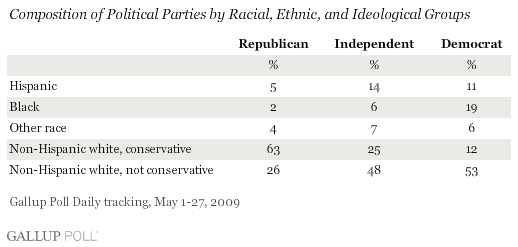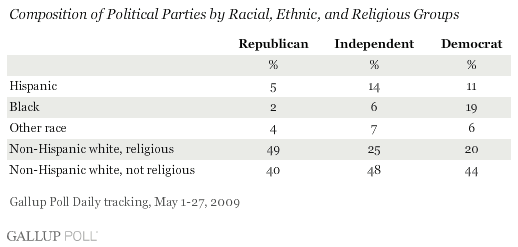PRINCETON, NJ -- More than 6 in 10 Republicans today are white conservatives, while most of the rest are whites with other ideological leanings; only 11% of Republicans are Hispanics, or are blacks or members of other races. By contrast, only 12% of Democrats are white conservatives, while about half are white moderates or liberals and a third are nonwhite.

These data reinforce the basic challenge facing the Republican Party today as it ponders how best to remedy a situation that finds Democrats in control of the White House and both houses of Congress. Republicans have a clear monopoly on the allegiance of white conservative Americans, but the GOP's challenge is figuring out whether this is enough of a base on which to build for the future. The alternative is for the GOP to broaden its base to include more minorities and/or more whites who are moderate or liberal in their ideological outlook -- groups now predominantly loyal to the Democratic Party.
The current analysis is based on a sample of more than 26,000 interviews Gallup conducted May 1-27, 2009. Each of the three major political groupings -- those who identify themselves as Republicans, as Democrats, and as independents -- was decomposed into five mutually exclusive and exhaustive categories:
-
Hispanics
-
Non-Hispanic blacks
-
Non-Hispanics who identity their race as something other than white or black
-
Non-Hispanic whites who identify themselves as conservative
-
Non-Hispanic whites who identify their ideology as something other than conservative -- including moderates, liberals, and those who don't express an ideological preference
The results show clearly that the Republican Party today is first and foremost a political entity dominated by white Americans. Eighty-nine percent of rank-and-file Republicans are non-Hispanic whites, leaving just 5% who are Hispanic (of any race), 2% who are black, and 4% of other races.
Further, by well over a 2-to-1 ratio, whites who identify as Republicans claim a conservative, rather than a moderate or liberal, ideology (or have no opinion when asked about their ideology).
Democrats have a significantly more diverse party composition. Well over a third (36%) of Democrats are nonwhite (Hispanic, or black or some other race) and the 64% of Democrats who are white are strongly skewed -- by more than a 4-to-1 ratio -- toward an ideological position that is moderate or liberal rather than conservative.
Independents, as would be expected, are somewhere between Republicans and Democrats in terms of their racial, ethnic, and ideological composition. Twenty-seven percent of independents are Hispanic, or are black or identify with another race, and, by about a 2-to-1 ratio, white independents split toward the nonconservative ideological position.
Religiosity
A similar pattern is found when the three partisan groups are broken down into segments based on race, ethnicity, and religious intensity (among whites, as measured by church attendance).

About half of Republicans are non-Hispanic whites who are strongly religious, defined as those who attend church about once a week or more frequently. Forty percent of Republicans are whites who attend less frequently.
Democrats, on the other hand, comprise only 20% highly religious whites, with more than twice as many whites who attend church less frequently. The pattern of church attendance among independents is similar to that among Democrats, but independents have higher percentages of whites in both the religious and the nonreligious categories.
Implications
A great deal of attention has been paid to the plight of Republicans who at this juncture in history find themselves not controlling the presidency, the House, or the Senate. Plus, numerous surveys conducted by Gallup and other firms have shown that the GOP appears to be suffering on a number of perceptual dimensions compared to the Democrats (as measured by Gallup and by other recent surveys).
The data reviewed here highlight an essential dilemma the Republicans face as they ponder their future. The Republican Party's constituency is overwhelmingly white -- and the significant majority of those whites are ideologically conservative, while a majority are highly religious, as defined by church attendance. The Democratic Party, on the other hand, has more than three times the percentage of nonwhites among its identifiers as does the GOP. And white Democrats are much more likely to be moderate or liberal than conservative, and are much more likely to be infrequent church attenders rather than frequent church attenders.
Does the Republican Party in essence "stick to the knitting" and cling to its core conservative principles? Or should the Republicans make an effort to expand their base -- among whites who are moderate or less religious, and/or the various nonwhite groups who to this point are largely ignoring the Republican Party in favor of the Democrats? The decision the party makes in response to this question could be pivotal in helping determine its future.
Survey Methods
Results are based on telephone interviews with 26,314 national adults, aged 18 and older, conducted May 1-27, 2009, as part of Gallup Poll Daily tracking. For results based on the total sample of national adults, one can say with 95% confidence that the maximum margin of sampling error is ±1 percentage points.
Interviews are conducted with respondents on land-line telephones (for respondents with a land-line telephone) and cellular phones (for respondents who are cell-phone only).
In addition to sampling error, question wording and practical difficulties in conducting surveys can introduce error or bias into the findings of public opinion polls.
